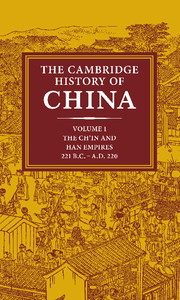Book contents
- Frontmatter
- Introduction
- 1 The state and empire of Ch'in
- 2 The Former Han dynasty
- 3 Wang Mang, the restoration of the Han dynasty, and Later Han
- 4 The conduct of government and the issues at stake A.D. 57–167
- 5 The fall of Han
- 6 Han foreign relations
- 7 The structure and practice of government
- 8 The institutions of Later Han
- 9 Ch'in and Han law
- 10 The economic and social history of Former Han
- 11 The economic and social history of Later Han
- 12 The religious and intellectual background
- 13 The concept of sovereignty
- 14 The development of the Confucian schools
- 15 Confucian, Legalist, and Taoist thought in Later Han
- 16 Philosophy and religion from Han to Sui
- Bibliography
- Glossary-Index
- Map 7 The Han empire, 143 b.c.
- Map 8 The Han empire, 108 b.c
- Map 9 The Han empire, a.d. 2
- Map 12 The Han empire, a.d. 140">
- References
4 - The conduct of government and the issues at stake A.D. 57–167
Published online by Cambridge University Press: 28 March 2008
- Frontmatter
- Introduction
- 1 The state and empire of Ch'in
- 2 The Former Han dynasty
- 3 Wang Mang, the restoration of the Han dynasty, and Later Han
- 4 The conduct of government and the issues at stake A.D. 57–167
- 5 The fall of Han
- 6 Han foreign relations
- 7 The structure and practice of government
- 8 The institutions of Later Han
- 9 Ch'in and Han law
- 10 The economic and social history of Former Han
- 11 The economic and social history of Later Han
- 12 The religious and intellectual background
- 13 The concept of sovereignty
- 14 The development of the Confucian schools
- 15 Confucian, Legalist, and Taoist thought in Later Han
- 16 Philosophy and religion from Han to Sui
- Bibliography
- Glossary-Index
- Map 7 The Han empire, 143 b.c.
- Map 8 The Han empire, 108 b.c
- Map 9 The Han empire, a.d. 2
- Map 12 The Han empire, a.d. 140">
- References
Summary
The preceding chapter has described how the control of political decisions and the exercise of dominant power shifted between different families and factions; the author's observation that the political history of this period is in large measure a history of its factions is borne out all too clearly by the sources. However, the purposes for which those sources were drawn up were such that many of the questions which interest historians today called for little comment at the time. There are therefore no immediate answers to questions such as whether a relationship may be traced between the adoption of different policies of state and the rise of different families or groups to prominence. We do not know how far the interests and landholdings of particular families conflicted with the efficiency of imperial administration or the introduction of economic innovations. Nor can we assess in what ways the practical operation of imperial government varied during the Later Han or how it was affected by the turmoil of factional strife. Nevertheless, when due allowance is made for bias, the histories still yield some reliable hints regarding the state and stability of government during the decades that followed the death of Kuang-wu-ti in A.D. 57 and preceded the accession of Ling-ti in A.D. 168. The many complaints against oppression or corruption were surely based on more than a grain of truth. There is some evidence of how the exercise of power monopolies affected recruitment to the civil service. The references to the protocol of the court and to the promotion of learning indicate a deliberate display of a devotion to traditional values by some who were at the same time apparently flouting the recognized and approved means of government; and the protests leveled against the extravagance of the imperial family and others are too frequent to be dismissed as being no more than complaints of the envious.
- Type
- Chapter
- Information
- The Cambridge History of China , pp. 291 - 316Publisher: Cambridge University PressPrint publication year: 1986
References
- 3
- Cited by

